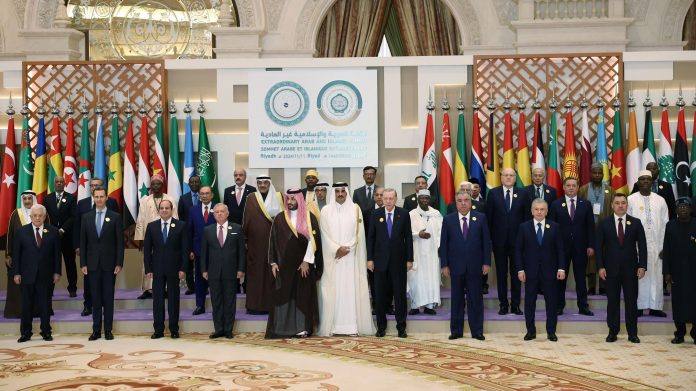Saudi Arabia is leading an urgent Arab initiative to develop a plan for Gaza’s future, offering an alternative to the proposal from former U.S. President Donald Trump. His plan aimed to relocate Palestinians from the territory, a move that surprised and concerned many Arab leaders.
Riyadh will host discussions this month, bringing together Saudi Arabia, Egypt, Jordan, and the United Arab Emirates. Five sources said the talks will explore a Gulf-led reconstruction fund and ways to limit Hamas’s influence.
Arab states, particularly Saudi Arabia and its allies, strongly opposed Trump’s suggestion to move large numbers of Palestinians to Jordan and Egypt. Both countries rejected the idea, calling it destabilising.
Saudi officials also worry that Trump’s approach undermines their key condition for normalising ties with Israel: a clear commitment to Palestinian statehood. They see this demand as linked to broader diplomatic goals, including a potential military pact with the United States to strengthen Saudi security.
Arab states push for a new approach
Arab nations are working to merge existing proposals into a single plan they believe the U.S. administration will accept. Some sources suggested branding it as a “Trump Plan” to increase the chances of approval.
An Arab government official said leaders have reviewed at least four proposals. However, Egypt’s plan has gained the most traction.
Saudi Arabia backs Egypt’s proposal for Gaza
According to three Egyptian security officials, the plan includes:
- A national Palestinian committee to govern Gaza, excluding Hamas.
- International support for reconstruction without forcing Palestinians to leave.
- Progress towards a two-state solution.
Representatives from Saudi Arabia, Egypt, Jordan, the UAE, and the Palestinian leadership will meet in Riyadh to finalise details before presenting them at an Arab summit on 27 February.
Saudi Crown Prince Mohammed bin Salman plays a central role in these efforts. “We are telling the Americans we have a plan that works. Our meeting with MBS is going to be critical. He is taking the lead,” a Jordanian official said.
The crown prince has maintained strong ties with the U.S. and remains a key figure in Arab-American diplomacy. Saudi Arabia’s influence extends beyond regional politics. This month, its sovereign wealth fund is hosting a major business conference in Miami, which Trump is expected to attend. Additionally, Riyadh may host Trump’s upcoming talks with Russian President Vladimir Putin about the Ukraine conflict.
Challenges in defining Gaza’s future
So far, leaders have struggled to agree on Gaza’s postwar governance, security, and reconstruction.
Israel refuses to allow Hamas or the Palestinian Authority to govern Gaza. The U.S. and Arab states have also ruled out deploying their own troops.
Gulf countries, which have funded previous reconstruction efforts, are reluctant to invest again without guarantees that new infrastructure will not be destroyed in future conflicts.
Jordan’s King Abdullah raised these concerns during his meeting with Trump in Washington. He stressed that Saudi Arabia and Egypt were working on an alternative proposal. After the talks, he confirmed that Arab nations would review Egypt’s plan and discuss it further in Saudi Arabia.
The Egyptian security sources revealed early reconstruction plans, which include:
- A buffer zone and physical barrier to prevent tunnel construction along Gaza’s border with Egypt.
- The creation of 20 temporary living areas once debris is cleared.
- Engagement of around 50 Egyptian and foreign companies in rebuilding efforts.
Funding would come from international and Gulf sources. A regional official suggested that naming the reconstruction fund after Trump could help secure his support.
The dispute over Hamas’s role
Determining Gaza’s governance and security remains the most contentious issue.
An Arab official and three Egyptian sources stressed that any solution must exclude Hamas from power. Although Hamas has agreed to step aside for a national committee, it insists on selecting its members. It also rejects the presence of foreign security forces unless it approves their deployment.
Despite the lack of major new elements, officials believe the Egyptian plan is strong enough to persuade Trump. They also think it could be imposed on both Hamas and the Palestinian Authority under Mahmoud Abbas.
Saudi Arabia responses to Trump’s plan
Saudi concerns about Gaza had been growing even before Trump’s proposal. The kingdom has repeatedly stated that normalisation with Israel requires a clear pathway to Palestinian statehood, including the West Bank, Gaza, and East Jerusalem.
Public anger in Saudi Arabia over the war in Gaza has strengthened this position. In November, Crown Prince Mohammed bin Salman publicly accused Israel of genocide at an Islamic summit and reaffirmed the need for a two-state solution.
Two regional intelligence sources described frustration within Saudi leadership over the ongoing conflict.
However, Trump appeared to dismiss these concerns. When asked if Saudi-Israel normalisation could proceed without a two-state solution, he said: “Saudi Arabia is going to be very helpful.”
His Middle East envoy, Steve Witkoff, met Saudi officials in January and outlined a three-month timeline for normalisation. However, Trump’s Gaza proposal came as a shock to Saudi officials. “He is not pleased,” a source close to the Saudi royal court said of Prince Mohammed’s reaction.
Saudi state media, often seen as a reflection of official policy, aired strong criticism of Israeli Prime Minister Benjamin Netanyahu following the announcement.
“They are outraged,” said Aziz Alghashian, a Saudi analyst familiar with government sentiment. “This is more than frustration; this is something else entirely.”
Some analysts believe Trump is using a negotiation tactic by starting with an extreme position. He often took a similar approach during his first term. However, his proposal has complicated normalisation talks.
Former Saudi intelligence chief Prince Turki al-Faisal, who no longer holds an official role, told CNN that if Trump visits Riyadh, “I’m sure he will get an earful from the leadership here.”
When asked if normalisation talks with Israel could continue, he responded: “Not at all.”
